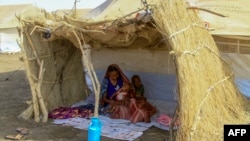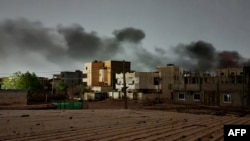Millions of people are displaced and on the verge of famine. Sexual and racial violence. Infrastructure was destroyed. Aid workers say a year of war between rival generals in Sudan has led to disaster but the world has rejected it.
The United Nations says the northeast African country is experiencing “one of the worst humanitarian disasters in recent years” and “the world’s largest internal displacement crisis”.
It’s also poised to become “the world’s worst hunger crisis.”
Aid workers call it the “forgotten war” affecting a country of 48 million people – more than half of whom they say require humanitarian assistance.
“People are being killed, raped, beaten, detained, beaten, taken away for months at a time. We are used to it,” said Mahmud Mokhtar, who spoke during the war. Provided voluntary social services in the Khartoum area before eventually fleeing. to Cairo.
Experts believe that on April 15 last year, Army Chief of Staff Abdel Fattah al-Burhan (Abdel Fattah al-Burhan) and his former deputy, the commander of the paramilitary Rapid Support Forces (RSF) Mohammed Hamdan Dar The battle that started between Mohamed Hamdan Daglo shows no sign of ending.
Thousands have since been killed, including as many as 15,000 in one town in West Darfur alone, according to U.N. experts.
More than 8.5 million people have had to flee their homes to seek safety elsewhere in Sudan or across borders to neighboring countries.
Senior Sudan expert Alex de Waal said the war was “brutal, devastating and shows no sign of ending”.
But even if the violence stops now, “the country has collapsed and the road to reconstruction is long and challenging,” de Waal said.
Before the bombing and looting began, Sudan was already one of the poorest countries in the world.
Yet the United Nations said its humanitarian response program was only 3.1% funded as of January, barely reaching one in 10 people in need.
‘A landmark of shame’
“Before the war started, there were dozens of international organizations responding across the country,” said Christos Christou, international president of the medical charity Médecins Sans Frontières (MSF).
“Now, there’s almost none.”
Researchers say health systems have all but collapsed and most agricultural land – a major employer and once touted as a model for Africa’s development – has been taken out of use.
Gibril Ibrahim, the finance minister in the army-allied government, said in early March that Sudan had lost “80 percent of its revenue.”
The situation became even more dangerous days later when the energy minister declared force majeure over a “major rupture” of an oil pipeline. Oil exports through neighboring South Sudan bring in tens of millions of dollars a month.
For desperate civilians, almost all that’s left is mutual aid: volunteers organizing soup kitchens, evacuation plans and emergency medical care.
“The world continues to turn a blind eye,” said Will Carter, Sudan country director of the Norwegian Refugee Council, which along with Médecins Sans Frontières is one of the few humanitarian organizations still operating on the ground.
He said the anniversary of the war was a “milestone of shame” and accused the international community of “allowing this disaster to worsen”.
On the ground, Doctors Without Borders now controls much of the capital and West Darfur.
The paramilitary forces are derived from the feared Janjaweed militia, which was unleashed by the government of former strongman Omar al-Bashir to suppress an ethnic insurgency.
The International Criminal Court (ICC) has charged Bashir with genocide, crimes against humanity and war crimes since 2003, but Sudanese authorities never handed him over after overthrowing him after mass protests in 2019.
‘Pure evil’
In the current war, government forces use air power to bomb ground targets but have failed to recapture much of the territory and have been accused of attacking civilians.
“Ultimate victory is impossible,” said a former military officer who requested anonymity.
Sudanese analyst Mohamed Latif agreed, telling AFP that a win was “impossible” for both sides at the moment.
“Their troops are exhausted and their supplies are running out,” Latif said.
However, human rights groups say there is no shortage of abuses against civilians.
“What is happening is bordering on pure evil,” Clementine Nquita-Salami, the U.N. humanitarian coordinator for Sudan, said early in the war.
The army recently took over houses in Khartoum’s twin city of Omdurman, after Médecins Sans Frontières seized similar houses early in the fighting, according to the pro-democracy Lawyers’ Council.
Like other volunteer groups across Sudan, the Lawyers Committee has spent the past year painstakingly documenting a variety of violations, including summary executions, the use of sexual violence as a weapon of war, and the forced recruitment of children.
The International Criminal Court is currently investigating ethnic-based killings in Darfur, mainly carried out by Forces Without Borders, and has said it has “reasons to believe” atrocities were being committed by both sides.
International mediation efforts produced only a declaration of armistice, which was quickly violated.
A call for a ceasefire issued by the United Nations Security Council last month also failed to end the war, as did Western sanctions.
De Waal said the war was “a maelstrom of transnational conflict and global competition that has the potential to trigger a wider regional crisis”.
Experts say both sides are seeking regional support, with the United Arab Emirates being portrayed as the main foreign backer of Forces Without Borders, which its leaders deny.
Washington has said talks could restart around April 18, but military-aligned prosecutors have since taken action against civilian leaders the international community views as potential partners.
Still, de Waal said, “it should not be difficult to reach consensus across Africa and the Middle East that state collapse is in no one’s interest.”
Faced with these complex realities, Amir Sohail, a displaced person taking refuge in Darfur’s Abu Shouk camp, has a simple hope: “God will help us achieve peace this year.”
Follow us on Google news ,Twitter , and Join Whatsapp Group of thelocalreport.in

